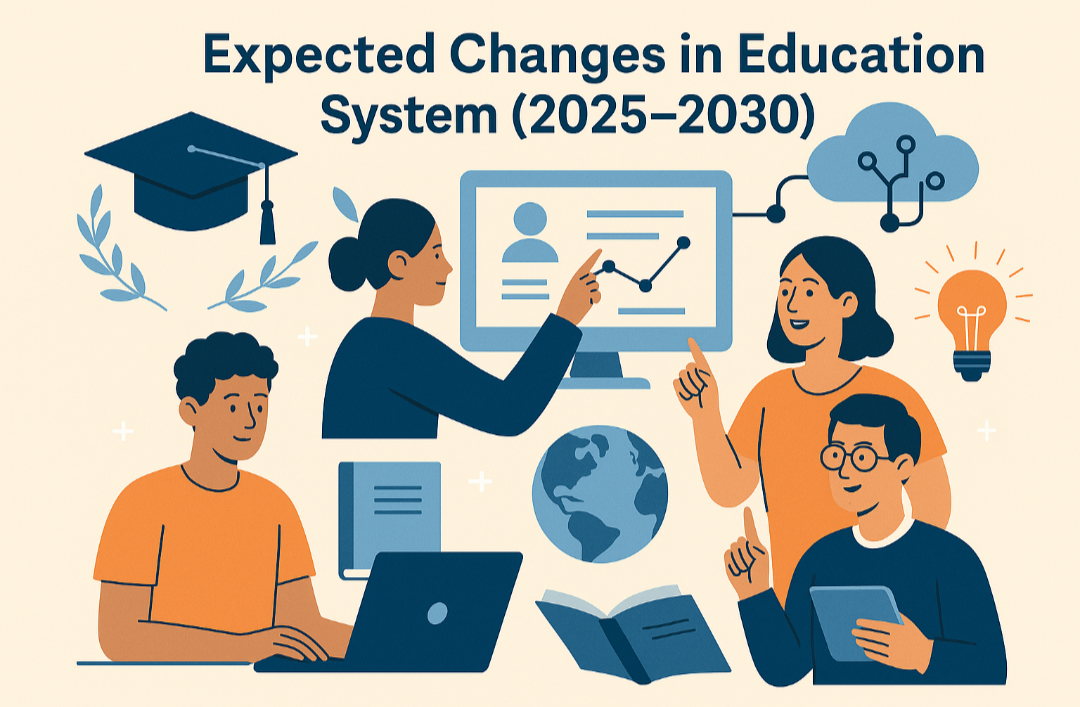
Expected Changes in the Education System (2025–2030)
1. Rise of Artificial Intelligence in Teaching and Administration
One of the most transformative shifts in education over the next five years will be the integration of **artificial intelligence (AI)**. AI-powered tools such as automated grading systems, virtual tutors, and chatbots will become more common, improving efficiency for educators and accessibility for students. Platforms like Khan Academy are already experimenting with AI tutors powered by GPT technology. By 2030, these tools are expected to personalize learning paths and adapt content to individual student needs in real time.
2. Global Expansion of Hybrid and Remote Learning Models
While remote learning exploded during the COVID-19 pandemic, its legacy will continue to shape education systems through 2030. Hybrid models that combine in-person and online instruction will become standard. Students will be able to attend school both physically and virtually, accessing recorded lectures, interactive content, and online collaboration tools. Institutions such as edX and Coursera are leading this trend with accredited online programs. This change will democratize access to education globally, especially in rural and underserved communities.
3. Personalization of Learning Experiences
The “one-size-fits-all” model is slowly being replaced by **personalized learning** approaches. Thanks to big data and machine learning, teachers and platforms can now analyze student progress and tailor content accordingly. By 2030, every student might have a unique educational path, shaped by interests, strengths, weaknesses, and even emotional responses to material. Companies like Duolingo and BYJU’S are early examples of this model in practice.
4. Curriculum Shift Toward Future-Ready Skills
The gap between traditional curricula and real-world skills is growing. Education systems are expected to focus more on **21st-century competencies** such as critical thinking, creativity, emotional intelligence, digital literacy, and sustainability. Coding, data science, media literacy, and climate awareness will likely be included in core subjects by 2030. According to the World Economic Forum, over half of all workers will need reskilling by 2027, and schools must respond accordingly.
5. Emphasis on Mental Health and Well-Being
Rising anxiety, stress, and burnout among students and educators have placed **mental health** at the center of educational reform. The next five years will likely see schools implementing mental health curricula, hiring trained counselors, and fostering a more supportive environment. Social-emotional learning (SEL) will become as essential as academic instruction. Organizations like the Collaborative for Academic, Social, and Emotional Learning (CASEL) are setting standards for SEL integration.
6. Redefining Assessment and Grading Systems
Traditional exams and grades are being questioned for their effectiveness and fairness. From 2025 to 2030, we can expect a shift toward **competency-based assessment**, where students are evaluated on mastery rather than test performance. Portfolios, project-based evaluations, and peer assessments will become more prevalent. This shift will also help identify different learning styles and give a more holistic picture of student abilities.
7. More Inclusive and Equitable Education
Ensuring **equity in education** remains a challenge, especially for marginalized communities, students with disabilities, and non-native speakers. Future education policies will aim for inclusive design from the ground up — this includes multilingual platforms, accessible formats, gender-sensitive curricula, and support services. Initiatives like UNESCO’s Inclusion in Education framework are expected to influence national strategies.
8. Strengthening the Role of Teachers Through Continuous Training
The teacher’s role will evolve from knowledge-deliverer to **learning facilitator and mentor**. As new tools and pedagogies emerge, educators will require continuous upskilling. Governments and institutions are investing in professional development programs, edtech certifications, and international exchanges. Programs like Teach For All emphasize leadership and adaptability as core teaching skills in the coming era.
9. Environmental Education and Sustainability
As climate change increasingly affects our world, **education for sustainability** will become a permanent fixture in schools. Students will be taught about renewable energy, environmental stewardship, and climate action from an early age. Many schools are incorporating green infrastructure, waste-reduction programs, and eco-friendly transportation into their daily operations. This aligns with the UN’s Sustainable Development Goal 13 (Climate Action).
10. Greater Involvement of Parents and Communities
The next phase of education will see stronger collaboration between **schools, parents, and communities**. Technology allows parents to track progress, attend virtual meetings, and participate in school activities. Meanwhile, communities are becoming active in shaping school culture, contributing expertise, and supporting extracurricular programs. A whole-child approach — including family and social dynamics — is gaining momentum as a core education strategy.
11. Policy Reforms and Investment in Public Education
Finally, the pace of educational transformation depends heavily on **government policy and funding**. Between 2025–2030, countries will need to re-evaluate national budgets, prioritize public education, and close funding gaps between schools. Digital equity, AI infrastructure, teacher salaries, and curriculum reform all require political will and long-term vision. Partnerships between governments, nonprofits, and the private sector will be crucial to making these changes sustainable.
As we look ahead to 2030, education is set to become more personalized, equitable, and responsive to global challenges. The coming years present a rare opportunity to redesign education for a better future — one that empowers all learners to thrive in a rapidly changing world.